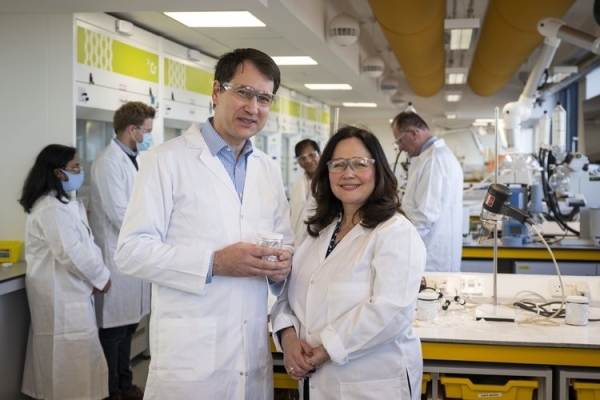Kellogg UK taps into Research Foundation’s mission to eliminate milk and peanut allergies

Around two million Brits are though to suffer a food allergy, causing symptoms from an itchy rash to anaphylaxis that causes breathing and swallowing difficulties. While there has been an increase in hospital admissions for food-induced anaphylaxis, death is rare and has fallen to less than 10 fatalities per year in the UK.
However, one death is just one too many – as in the case of Natasha Ednan-Laperouse, who died in 2016 after consuming an artichoke, olive and tapenade baguette from Pret a Manger in Heathrow before boarding a flight to Nice with her father Nadim and best friend Bethany.
The baguette had sesame seeds baked into the dough, which was unlisted on the label and to which Natasha was severely allergic.
To prevent more unnecessary deaths, in 2019, Tanya and Nadim Ednana-Laperouse set up The Natasha Allergy Research Foundation to fund vital medical research and raise awareness. The pair also campaigned tirelessly to introduce full transparency on food labels, and Natasha’s Law came into force across the UK in October 2021. This requires all food retailers to display full ingredient and allergen labelling on every item made on the premises and pre-packed for direct sale, such as on-the-go sandwiches.
Last year, the Research Foundation launched its first Natasha Clinical Trial to show that everyday foods that contain peanut or milk – taken according to a standardised protocol under medical supervision – can be used to treat people living with these allergies.
According to separate 2021 research into food-induced anaphylaxis in the UK, cow’s milk is now the single most common cause of fatal allergic reactions in children.
“There is now a lot of awareness of allergies to peanut and tree nut, but many people think milk allergy is mild, perhaps because most children outgrow it,” said Dr Paul Turner, lead author of the study from Imperial’s National Lung and Heart Institute.
“However, for those who don’t, it remains a big problem because milk is so common in our diet, and people don’t realise how dangerous it can be.”
The study – published in BMJ in – assessed anaphylaxis fatalities recorded since 1992, when data first became available, to 2018. There had been 187 fatalities in the period ‘likely caused by food-induced anaphylaxis. At least 86 (46%) of these were due to peanuts or tree nuts such as almonds, cashews and walnuts.
Sixty-six were child deaths, of which 14% were caused by peanuts and 9% by tree nuts. Cow’s milk was responsible for 26% of cases. Furthermore, the study saw a trend towards a greater proportion of reactions being caused by milk since 1992.
Game-changing research
Enter Kellogg’s and its close association with both those ingredients, particularly milk.
The Natasha trial is a three-year £2.2m oral immuonotherapy (OIT) study involving 216 children and young people between the ages of 3-23-years with milk and peanut allergies.
It’s being led by researchers from the University of Southampton and University Hospital Southampton NHS Foundation Trust, partnering with Imperial College London (both World Allergy Organisation Centres of Excellence) together with University Hospitals of Leicester NHS Trust, Newcastle University and Sheffield Children’s Hospital.
Currently, the main strategy for the majority of sufferers is to avoid allergy triggers – but even following good practice, someone with a peanut allergy will typically have an accidental reaction once every 2-3 years when eating out, often due to undeclared contaminants.
OIT offers the possibility of a long-term solution. Once the body has been desensitised to the food, allergy sufferers no longer need to worry about small amounts of accidental allergen presence. However, to maintain the desensitisation effect, they must consume a specific amount of the allergen.
The Natasha Clinical Trial is looking into ways to achieve this by using ‘everyday food’. If successful, participants with persistent food allergy will no longer have to live with the fear of food or avoid treats that might contain trace amounts of allergens due to production. They will be able to join the masses to eat popular grub like cakes, sandwiches, snacks and breakfast cereals.
The aim is to also get OIT – when used with commercially-available foods – approved for use by the NHS to treat food-allergic patients most at risk of anaphylaxis.
Helping to change millions of lives for the better

Under its Better Days promise to use food to benefit the full physical and mental wellbeing of millions of people around the globe, Kellogg’s has gifted a substantial donation to fund research undertaken by The Natasha Allergy Research Foundation.
“Millions of people in the UK are living with food allergies and worryingly this is growing,” said Jason Billingham, R&D senior director for Kellogg Europe.
“That’s why Kellogg is pleased to be working with The Natasha Allergy Research Foundation to support their mission to make allergies history.
“’As part of our Better Days promise ESG strategy, we are passionate about the role of food for full physical and mental wellbeing and are proud to be a partner of The Natasha Allergy Research Foundation to help change millions of lives for the better.
“We want people living with food allergies to be able to join in and enjoy all our different cereals with their family, friends, and colleagues at the breakfast table.”
Added Nadim Ednan-Laperouse OBE, “We are delighted that Kellogg is supporting our work with a generous donation to fund research in our mission to make allergy history.
“We want to deliver game-changing research studies that transform the lives of people and families living with food allergies. Kellogg’s support takes us one step closer."
Study:
Food anaphylaxis in the United Kingdom: analysis of national data, 1998-2018 - March 19, 2021
Authors: Paul J Turner, Alessia Baseggio Conrado, et al
BMJ 2021; 72b251
doi.org/10.1136/bmj.n251
The Clinical Trial Founding Partners are a consortium of food businesses, including Greggs, Tesco, Just Eat, Co-op Morrisons, KFC, Bakkavor, Sainsbury’s, Bidfood, Costa Coffee, Elior UK, Burger King UK, Pret A Manger, Lidl, Leon, Cooplands and Uber Eats.


















